PDFs can be a pain. As they were initially designed to be forms that were printed out and filled in by pen, they can feel somewhat anacronistic in the modern digital age. But, it’s not as hard to complete forms or annotate documents in this format, and you don’t even need expensive software to do it.
Here we look at a collection of PDF apps that are either completely free, or have a free trial version with a lot of the necessary functionality for a one-off PDF editing requirement.
Some of these apps do certain things better than others, so the best PDF editor for you will depend on what your particular needs. For example, if you want a PDF editor that can use OCR (optical character recognition) to read the text on a page you have scanned, and allow you to edit it, we have an option that can allow you to do that.
Alternatively, if you are looking for a PDF editor that’s simple to use and flexible enough to let you fill in a form without pulling out your hair, we have one below. We have even found a PDF tool that will let you import a PDF into Word (or Pages) and edit it there.
We have looked at the following features and abilities of the PDF Editors reviewed here:
Import: How faithful to the original PDF is the PDF editor? Does it maintain fonts and spacing? Can you open the PDF in Word, Excel etc?
Editing: Can you select text from the original PDF? Is the new text added in a separate text box? How easy is it to edit and delete content from the PDF? Can you move content around? Does the text you add maintain the style and formatting of the original PDF? Can you add hyperlinks or attach documents? Can you add images?
Collaboration: What markup tools are available? Can you highlight, underline, or strikethrough text? Can you use freehand drawing tools and an eraser. Can you add stamps? Can you track who reads and edits?
Signing: Can you add a signature? Is this signature scanned, imported, or typed? How many signatures can you save?
Saving: Can you resize the PDF? Can you stitch pages from multiple docs? Can you delete pages? Can you rotate pages?
Find & Replace: Can the PDF editor search the PDF? Can you find and replace words? Can you redact words?
OCR: Can the PDF editor read a scanned page – and can you edit that?
Watermark: Does it add a watermark? Can you add your own watermark?
Don’t forget that macOS comes with some PDF editing capabilities of its own in Preview, and you can read a bit more about how to work with it in tips for using Preview to edit a PDF on a Mac.
Preview
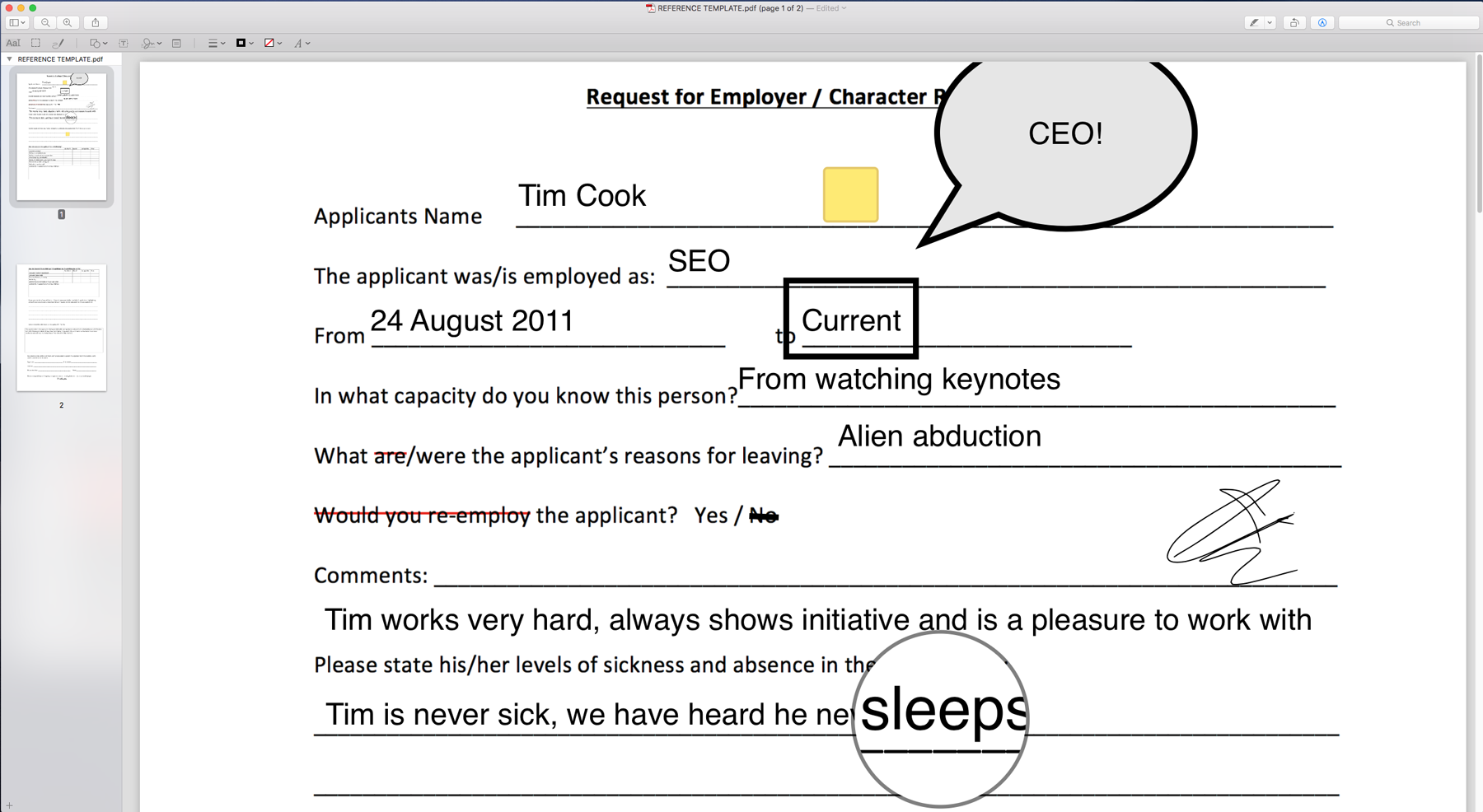
Pros
- Already on your Mac
- Surprisingly capable
Cons
- Limited feature set for advanced users
There is a free PDF editor already available on your Mac and it’s pretty good. It’s got some limitations, but it’s likely to offer enough tools for you if you just need to fill in some responses to questions on a PDF.
You can use Preview to add text (in text boxes), you can change the size, colour and font you use. It can be a bit fiddly to get the text box to line up with the text on the page, but it’s not impossible.
You can also perform actions like strike-through – initially we used the line shape, but then we discovered that it is possible to select strike-through from the menu (Tools > Annotate). You can also underline text the same way. These options are also available from the highlighter palette.
Under Annotate in the menu are options for adding a speech bubble. You can also add comments in the form of sticky notes.
Our spellings were checked as we typed – indicated by the usual squiggly line.
Adding a signature is simple, with three options for doing so: using a trackpad, iPhone or iPad, or by signing your name on a piece of paper and holding it up to the camera. You can save multiple signatures and add them to the document easily. We have a guide to adding a signature to a PDF here.
It’s easy to shuffle pages and add to, and delete pages from, a Preview PDF. If you can’t already see the thumbnail view on the left click on the drop down box above the A icon and choose Thumbnails.
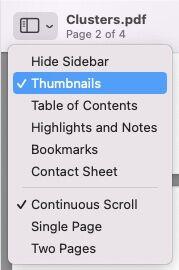
Now that you can see the thumbnails it is easy to shuffle page order, delete a page, and you can even drag and drop another PDF into the thumbnail column to add it.
It is also easy to rotate pages (click on the page in the Thumbnail view and click on the rotate icon in the menu).
You can export your PDF as a JPEG, TIFF, but there are no options for exporting to other apps, such as Word or Pages.
One of the newest features of Preview is an OCR – optical character recognition. If you are running macOS Monterey or later and you open anything in Preview – be it a PDF or a photo – you will be able to select most forms of text and cut and paste it in to a text document. We were able to select text, even if it was on a slant, and generally the results were good.
As we said above, Preview offers enough features if all you need to do is enter a bit of text and sign a PDF. So if you are trying to fill in an application form or filling in a few yes or no checkboxes, it’s likely to be sufficient. Those wanting a little more flexibility may find that Preview might not have enough features… in which case we have some options below that might prove more tempting.
Before you look at those, be sure to also read our full guide to using Preview on the Mac.
Adobe Acrobat Reader
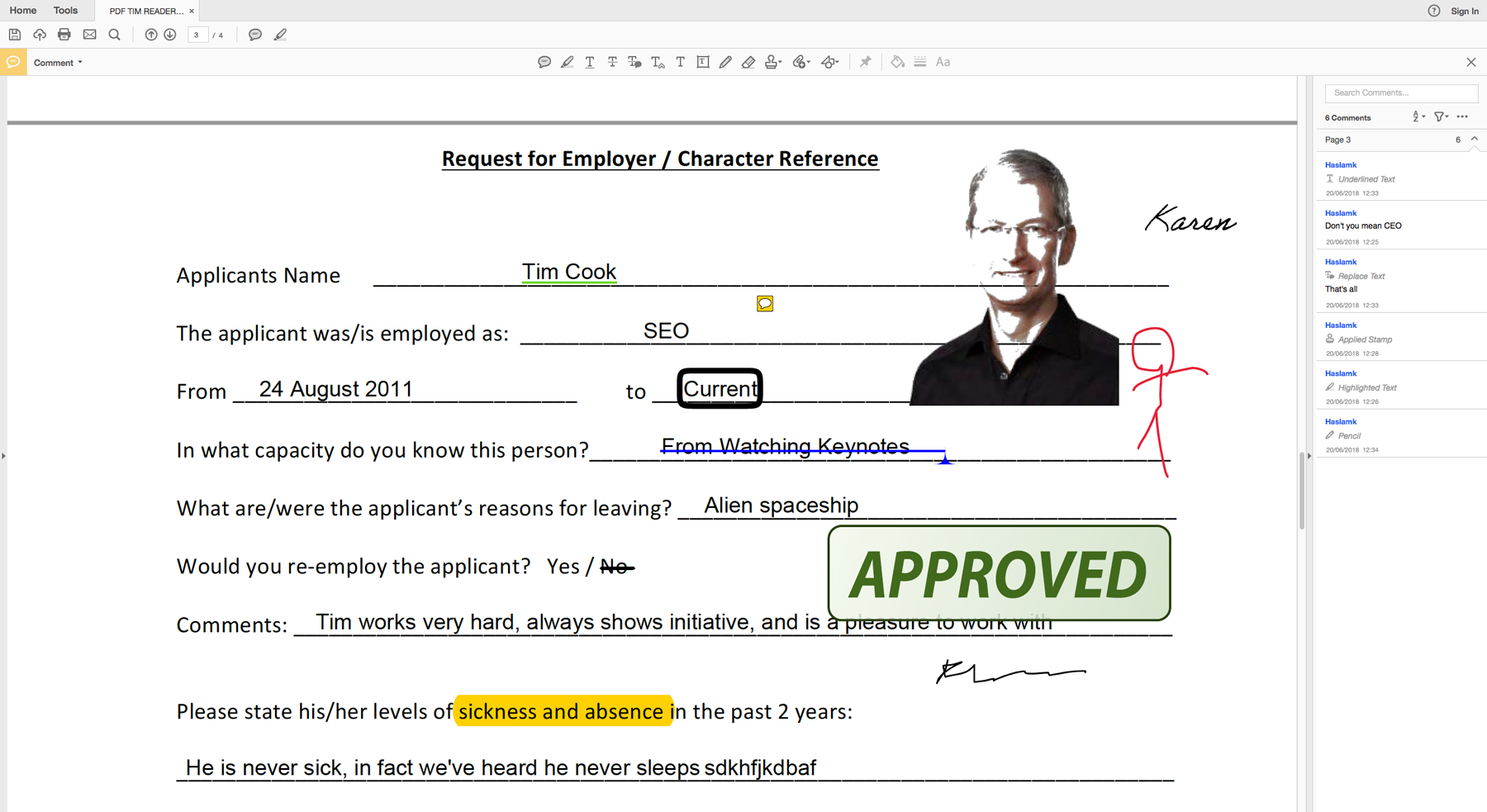
Pros
- Free tier is quite useful
- Comment, annotate and sign PDFs
- Free trial for paid tiers
Cons
- Some of the more advanced features only on paid tiers
- Expensive if you need a subscription
Adobe Acrobat Reader is free for some basic use, but some of the features require moving to the standard or Pro tiers that comes with a monthly, annual or prepaid annual subscription. Standard costs $22.99/£23.26 p/m, although you can lessen this if you commit to a year, which reduces the price to $12.99/£13.14p/m. The annual pay-up-front cost is $155.88/£156.89. The same options on the Pro tier will respectively set you back $29.99/29.96p/m, $19.99/19.97p/m or $239.88/£238.75 for the whole year. There’s a 7-day free trial available, so there’s no need to spend any money before deciding whether you need the extra features or not.
However, there are a lot of features that are available for free. You’ll find these in the Comment and Fill & Sign sections.
To add text to the PDF choose Fill & Sign. Here you will also find the options to add a tick or a cross, a circle, or a line. The signature option is here too, we’ll look at that in more detail below.
Comment options include the ability to add a speech bubble, highlight, underline, and strike-through words. In fact, you can strike-through and add a related comment. All your comments will appear in the sidebar on the right.
There are also tools here to draw and erase what you draw. A stamp tool with options like Approved, Revised, Confidential, Sign Here, and the option to import your own (these need to be in the PDF format, but it could be a way to add an image).
When adding a signature you have options to Type, Draw (using a mouse or trackpad), or Image. If you opt for the latter you could import a scan or photograph of your signature – you can import any image this way, but it will appear translucent, with the background appearing behind it as you can see from our illustration.
Acrobat Reader offers enough features to make it worth the download. It can be a tad annoying when it looks like you need to get a subscription to use features that it turns out can be performed without signing up, so beware of this before you spend
LibreOffice
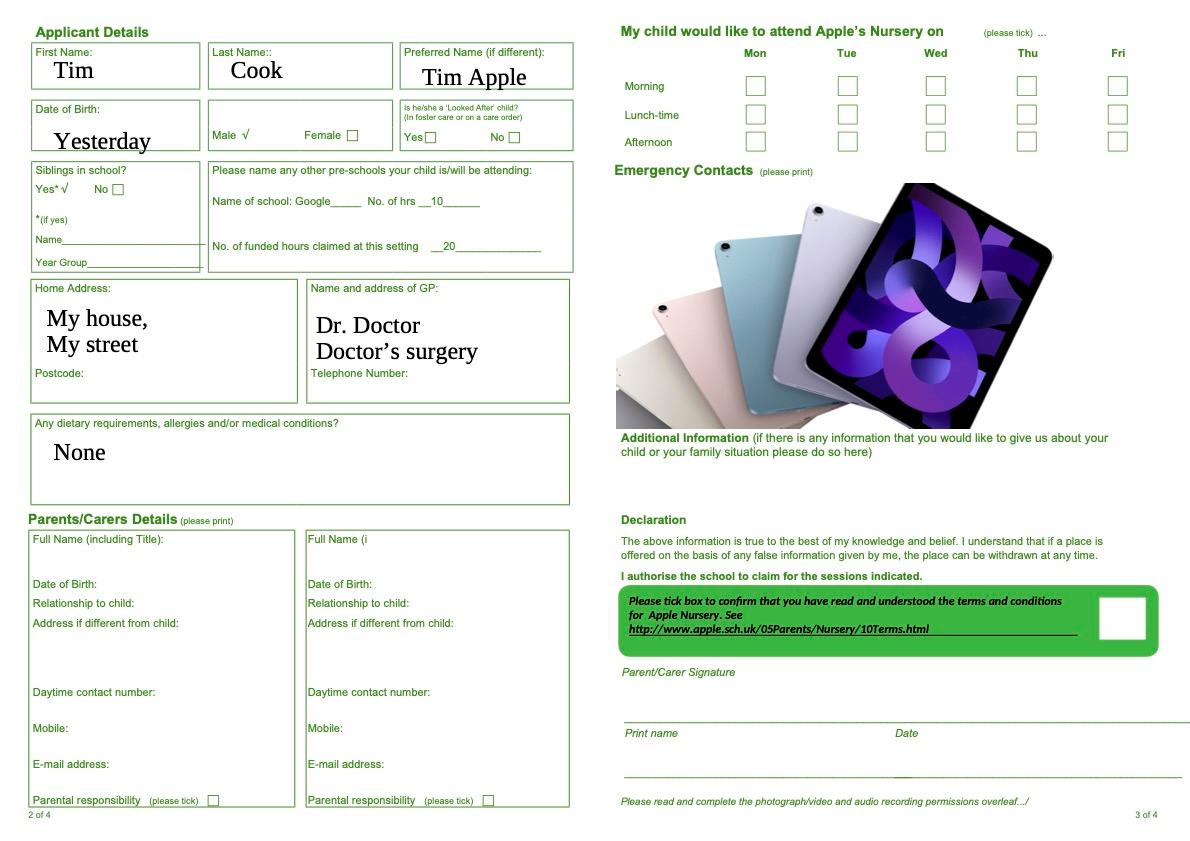
Pros
- Full office suite
- Edit text and add images
- Create PDFs
Cons
- No signature feature
- Limited features compared to dedicated PDF editors
LibreOffice is a free office suite with some handy features if you are wanting to edit and update PDFs.
Because it’s an office suite you benefit from all the Office-like features and familiar menus.
We were able to open a PDF in LibreOffice and edit text and add text and images. We weren’t able to add a signature, but this would be simple enough if you already had the signature as an image file.
You can also create a PDF from a document you create in LibreOffice, just as you can from Pages or Word. Create the document and then choose File > Export as PDF.
While it’s not a dedicated PDF editor or creator you can do many of the things you are likely to want to do to a basic PDF, so its a good option that comes with various benefits on account of it being a decent alternative to Microsoft Office. Read our round up of the best word processors for Mac for more information.
PDFelement
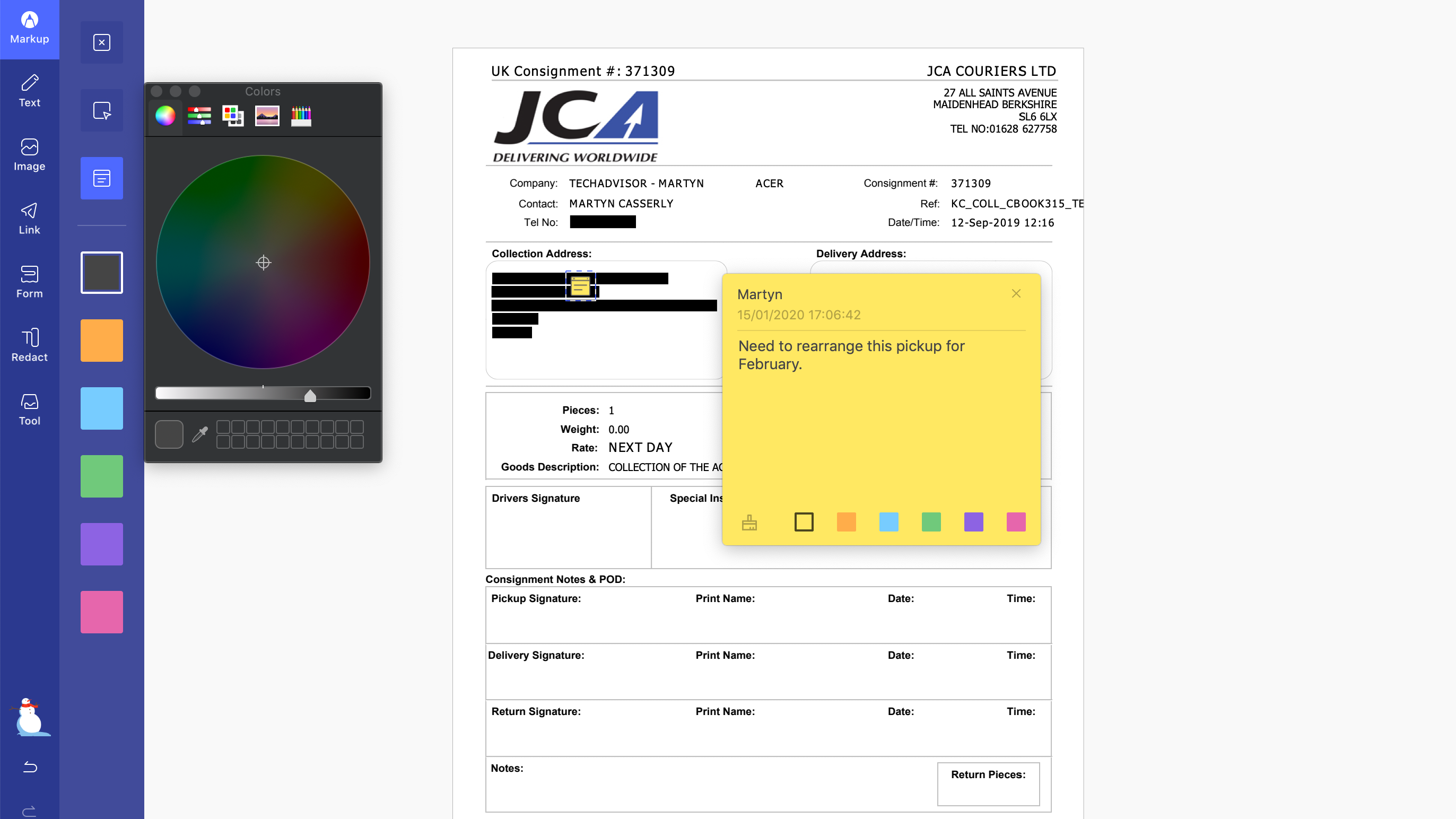
Pros
- Edit text and images
- Create new PDFs
- 7-day trial of full software
Cons
- Watermark can't be removed on free version
- Limited tools unless you pay
- No monthly plan
Wondershare’s PDFelement app brings a streamlined interface and additional capabilities that make it a fine choice for those who want pro level features at an affordable price, although there is, as with so many of these options, a free trial version.
With the latter, you can edit images and text, create PDFs and print them. If you register the demo then you’ll get access to almost the full range of features available on the paid version. One caveat here is that you’ll only be able to remove the PDF Element Pro watermark on the paid version and youre limited to PDFs with a maximum of three pages.
With the full software you can create new PDFs from scratch, convert Word, Excel or Powerpoint files, as well as quickly producing forms that can be used online, replete with dropdown menus.
Editing an existing PDF is straightforward, with tools for adding text or comments, annotating images and documents, plus the standard option of inserting a signature created on the trackpad. There’s also OCR capabilities that make it easy to scan in documents and have them converted into usable PDFs in minutes.
PDFelement is a comprehensive package with an interface that’s simple and intuitive.
The full Pro license costs $79.99 (approx £64) per year or $129.99 (approx £104) for a perpetual license.
For more tips, take a look at using PDFelement Pro on a Mac.
If you’d prefer a free version that you don’t have to pay for, PDF Reader is also from Wondershare, but this is an entirely free version of PDFelement that you can use on your iPad or iPhone to read, edit, annotate, convert and sign PDFs. You just need to register with Wondershare to use the app.
We’re mentioning it here because, while it’s not a Mac app, you might be happy to edit the PDF on your iPad or iPhone for the sake of getting a free option. Incidentally, there is a Windows version of PDF Reader.
Once the app was downloaded to our iPhone we were able to open PDFs that were stored in iCloud, edit text and add our own. You can add crosses and ticks (checks), draw on the PDF, strike through text, highlight text, and create and add a signature. Once your changes are made you can save.
Download Wondershare’s PDF Reader from the iOS App Store
PDFExpert for Mac
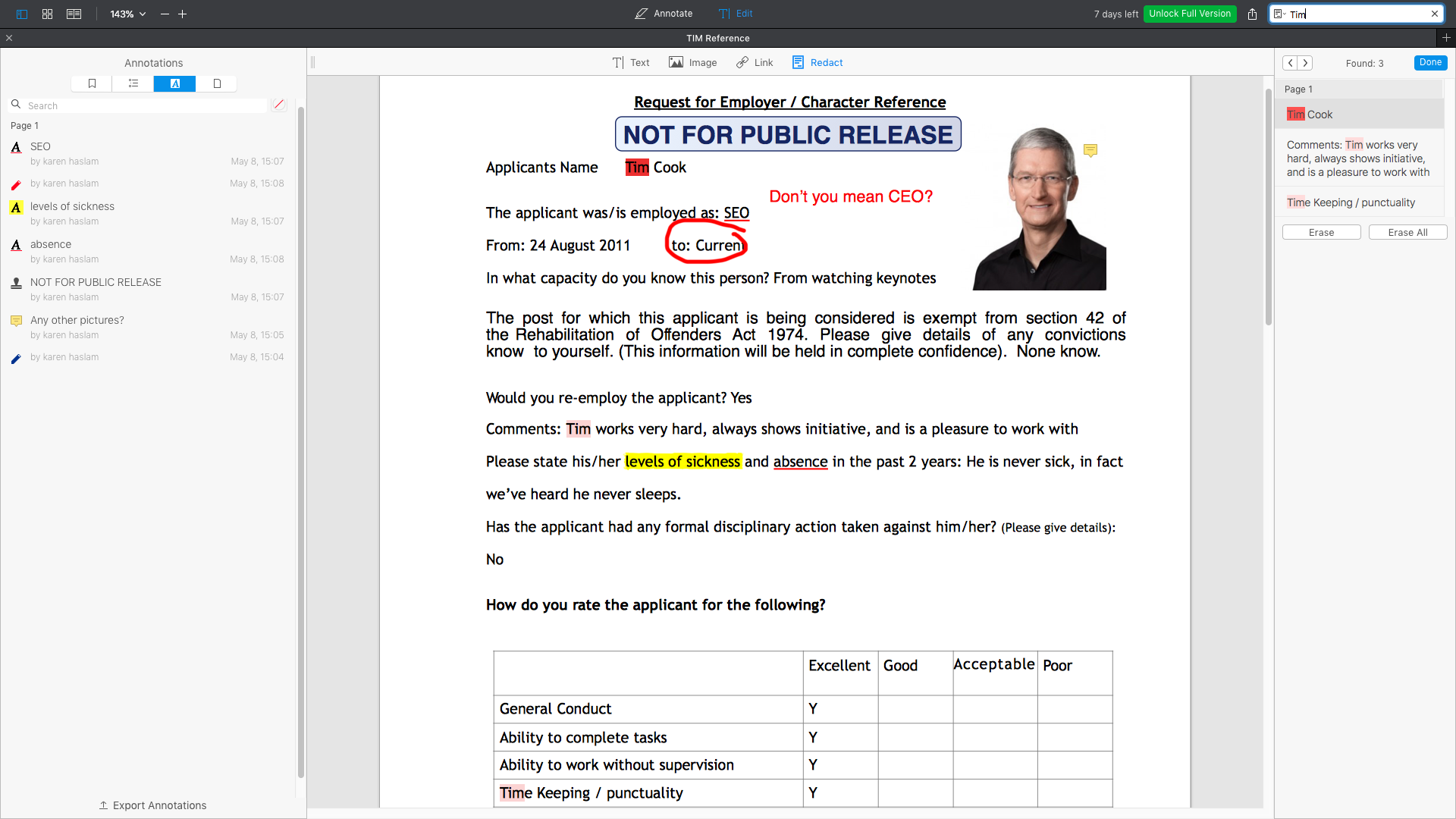
Pros
- Fully featured 7-day trial
- Lifetime plan is good value
- Lots of tools
Cons
- No permanent free tier
PDFExpert for Mac from Readdle offers a seven-day full-featured free trial, which could make it ideal if you just need a solution now and don’t expect to be editing PDFs again for a while. If you do need it for longer than a week it costs $79.99/£72.99 a year on subscription, or $139.99/£119.99 if you choose the Lifetime plan.
We found PDFExpert did a good job of maintaining the fonts, style and formatting of the original PDF.
There are two options for editing that you can find in the menu at the top of the page: Annotate and Edit. Under Annotate you will find the tool to easily add text to the PDF. You can choose the font and colour of the text here.
However, you will find the better editing tools under Edit. Here you have the option to actually edit the text already on the page, add images, add hyperlinks, and redact sensitive information (you can choose to black out names, or you can search for a specific word and delete every occurrence of that.)
We were able to select text and move it around the page. But as we found with all the PDF editors here, it wasn’t possible to drag and drop text between pages (to get around this we were able to cut and paste though and still make a good-looking document).
Back to the Annotate tab. Here you will find options to highlight, underline, or strike-through text, as well as a pan tool that means you can draw freehand in any colour, as well as change the line width and opacity. There’s also a crop tool here. In Annotate you can also add sticky notes and stamps (e.g. an Approval). You’ll see a column of existing annotations on the left so its easy to see what edits have been made and when. These annotations can be exported as HTML, text or markdown.
Adding a signature is also done via the Annotate tab. You can add more than one signature and these are added via the keyboard, trackpad, or an image. To add the signature to your PDF just drag and drop from the signature pane. You an also add a watermark yourself, perhaps your company logo, rather than having one added for you as is the case with some of the other trials looked at here.
Resizing a large PDF was easy thanks to a High/Low slider that indicated the size of the resulting file. There was also the option to merge files, combine multiple documents into one PDF, or individual pages from multiple documents.
We had one PDF that was scanned on our iPhone via the Notes app (we explain how to scan a document with an iPhone here). Obviously such a document will only be recognised by the PDF editor if the editor has OCR abilities that are unlocked in the trial. PDFExpert couldn’t do this so we weren’t able to edit the text in the scanned document, although we were able to add hyperlinks to sections of that document. Obviously we couldn’t search the scanned document, or edit the text there.
We were able to search normal PDFs though, and we were able to search for a word and redact every occurrence of it either by blacking it out, or deleting it.
We were able to export the PDF into Word, PowerPoint and Excel, as well as to Text and Image.
It’s a free seven day trial, so if you need the software for longer than that and don’t want to pay up then you would have to look elsewhere. But if you don’t need something long term this trial offers everything you need.
pdfFiller
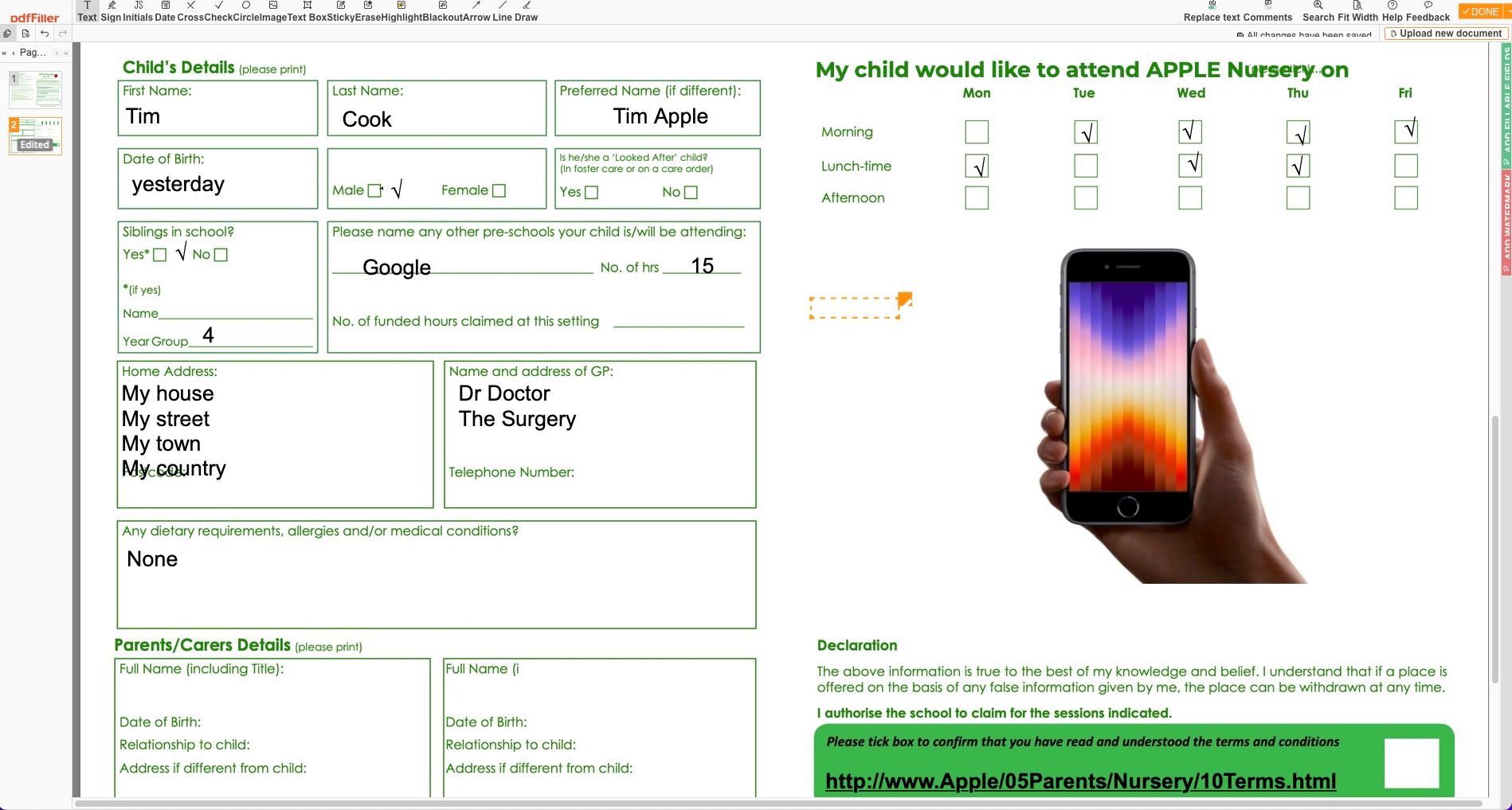
Pros
- Web based
- 30-day free trial
- Wide range of features
Cons
- No free tier
- No desktop version
pdfFiller from airSlate is another option if you want to edit and adjust a PDF. As with the other paid for PDF editors in this round up, there is a 30-day free trial that you can use (although it’s included with a full version when you sign up, so it would probably be more accurate to describe it as the first month free-you’ll need to cancel before the subscriptions start). You will need to enter your details, but since you can sign in with Apple you can avoid sharing your email address, which is nice.
It’s web based, although there is an iOS app you can use. You can add and edit existing text, copy and paste, and add images to the PDF. It’s also possible to add a signature – which is even electronically verified. You can easily combine multiple PDFs in one file. You can save your PDFs and collaborate with others while editing. If you are working as part of a team the lock and encryption options will be useful. It is even possible to create and host fillable forms that multiple users can fill in, and you can export the data added. Plus it is possible to convert documents from Word, JPG, Excel, PowerPoint and so on and create PDFs from them.
If you want to open up the whole app to use then you’ll need to sign up to a subscription. At the time of writing this costs $8 a month for the Basic version or $20 a month if you want to be able to cancel before the end of the first year.
PDF Candy
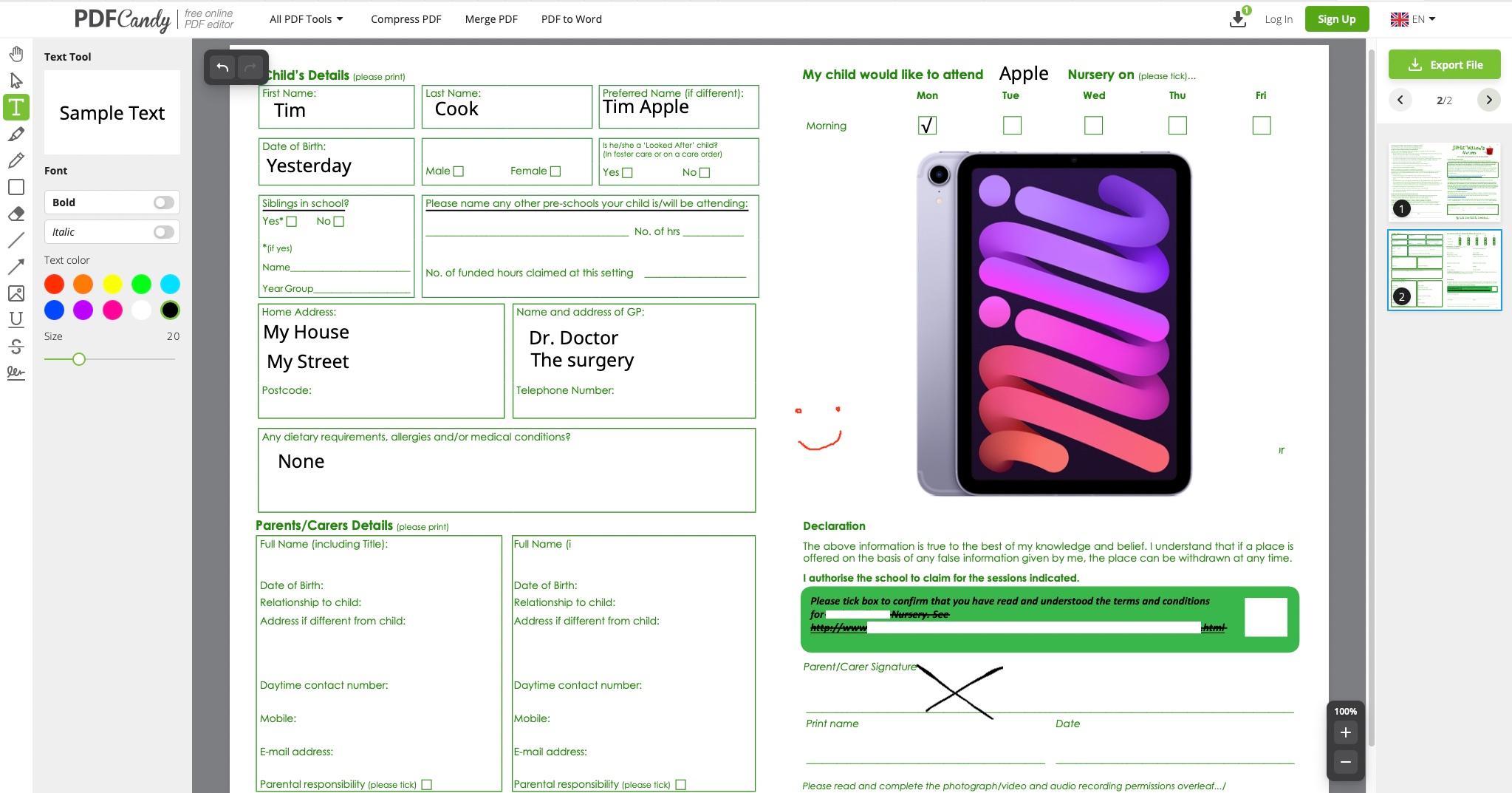
Pros
- Web based
- Easy to use
- Useful features
Cons
- Hourly limits on free tier
While there is no Mac app for PDF Candy, Mac users can use the free online version to add text to a PDF, as well as underlines, strike-throughs, and add signatures.
You can also compress and merge PDFs, rearrange pages, delete pages, rotate and crop PDFs.
Unfortunately you can’t add or change the text, so if you need to do that this isn’t going to suffice (although you can place white overlay over content you want to hide).
You can also convert PDFs to Word, Excel and various other documents using this free online tool. You then need to download it from the website. Unfortunately when we did this the word document we ended up with wasn’t quite what we’d started with.
There are limits to this free online version. For example, you can only perform one task per hour. If you want access to more tools (there are 47 in total) you need to register and select a plan. There are two on offer, you can pay monthly and cancel at any time for $6/£6, pay yearly for $48/£48. PDFCandy does also have a desktop+web offer for $99/£99 but that only pertains to the Windows version.
Skim
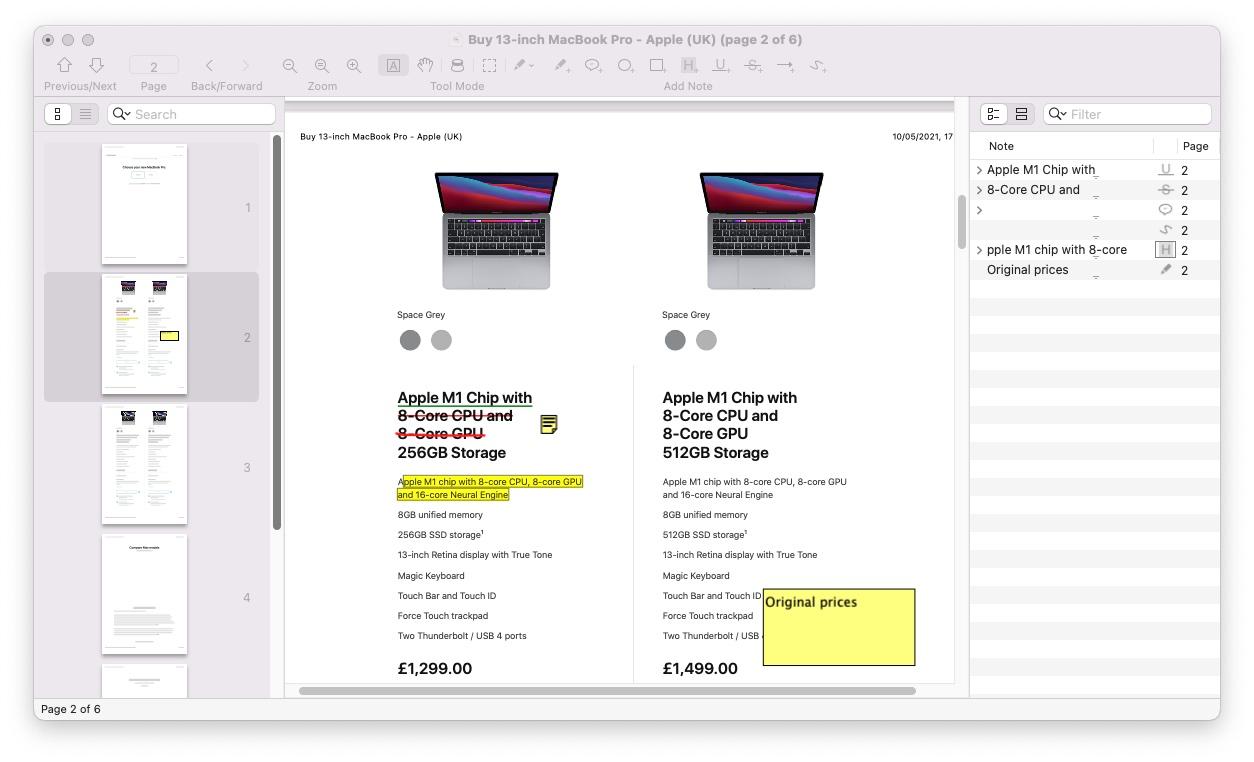
Pros
- Completely free
- Add notes, underline and highlight text
Cons
- Basic
- Mainly intended for reading PDFs
Skim is an open source, free PDF reader, so as long as you don’t expect more than basic functions you will be satisfied.
The tool allows you to view PDFs, add notes, underlines and highlight text.
Skim is more for reading PDFs – it was designed for academics, so it’s less about filling in and editing PDFs and more about the comfort of reading and navigating them along with the ability to add notes and bookmark pages. If all you want is a PDF reader this may well suit you. You can download it here.
FineReader Pro for Mac
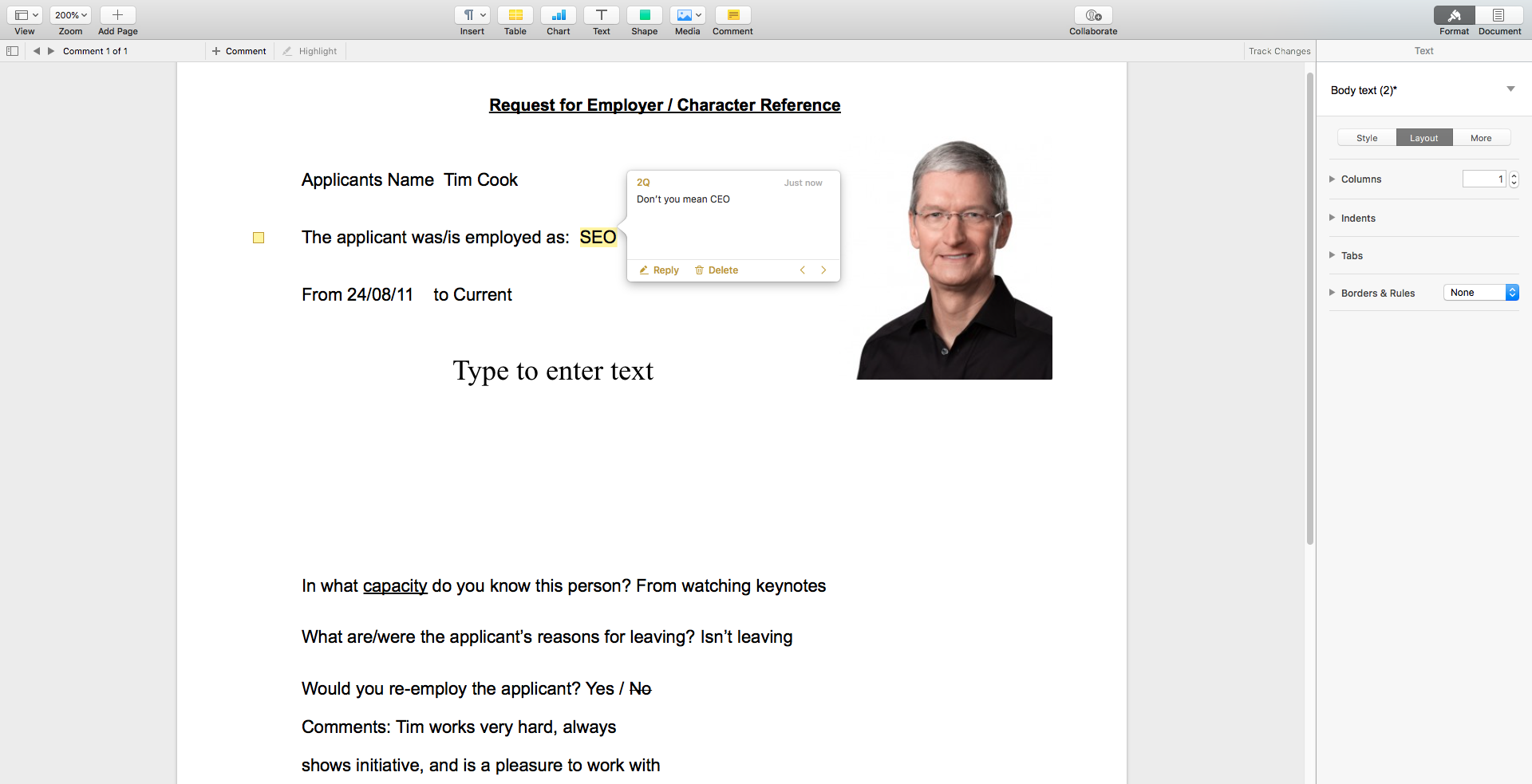
Pros
- OCR capabilities
- Allows PDF content to be edited in Word or Pages
Cons
- A bit hit and miss at times
- Quite a niche product
- Preview now has OCR capabilites
This is the app to try if you want OCR (optical character recognition) capabilities (although Preview does now offer these). However, we nearly didn’t realise how deep the capabilities of this app went because the results can be a little hit-and-miss. Actually, the capabilities of the 30-day free trial version are pretty impressive, as long as you are willing to accept that it might not always do a great job of translating what it ‘sees’.
We discovered this when we imported our PDF and were greeted with a warning to “Please re-scan your document at a higher resolution”. Given the PDF we were imported hadn’t been scanned we were a little confused by this. Then when we exported the ‘scan’ to Word we saw a warning that some of the pages had not been recognised. The resulting Word document (actually we opened it in Pages) was a little muddled, some of the translations were laughable. But the general content had come through well enough for us to be able to correct the mistakes.
Now, this probably wouldn’t do for you if you wanted to edit a straightforward PDF – if that’s the case use one of the other apps. However, if you had scanned text from a book or a printout and you wanted to edit that then this is the app for you.
As we mentioned earlier, we had a scan we had taken with our iPhone camera via the Notes app and we were able to get FineReader to ‘read’ this and open it as a Word document, which we could then edit. Sure, there might be a few words that are wrong, but it’s got to be better than typing the whole thing out.
Once in Word (or Pages), you can edit the document as much as you like. We did see a warning that fonts were missing, and there was a strange case of paragraph formatting that caused the text to wrap to the next line as if it was in a box, but it was a good effort we thought.
As for collaboration and editing you have all the tools that are available in the app you end up opening the document in, be that Word, Pages, Excel, PowerPoint or something else.
It might not be spot on every time, but the fact that we were able to scan a document and export it to Word where we could edit it, was a real bonus.
You can buy an annual subscription to FineReader for $69/£59, also available in the Mac App Store.
PDF Escape (macOS)
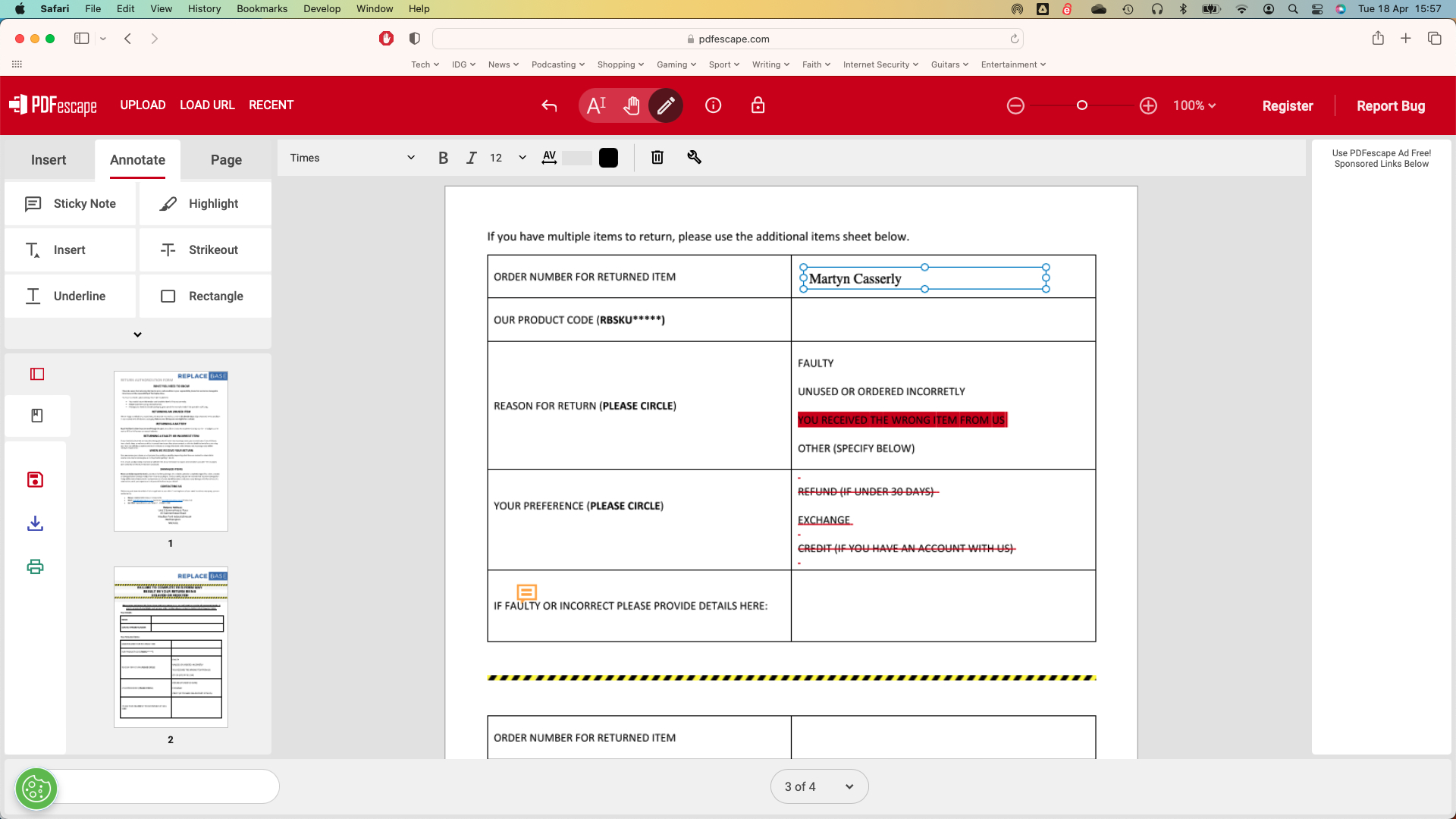
Pros
- Some useful tools
- Easy to use
- Web based
Cons
- File size limits on free tier
- Reduced editing features unless you pay
PDF Escape is another web-based editor that has decent tools on offer. To get started you upload documents to the site, then work in the online portal on your PDF. Like most of the packages on this list, there’s a limited free tier or a more powerful version can be unlocked through a paid subscription. You can still do a fair bit of work with the free version, so it’s a good place to start.
There are three main areas in the interface, comprised of Insert, Annotate, and Page. Within each of these you’ll find the relevants tools for editing text, images, links, adding notes, underlining, striking through text, plus you can reorder pages and use a few other useful organisational settings.
PDF Escape does impose a 10MB file size limit on the free tier, which will make larger PDFs a no-go. Perhaps a more limiting restriction is that the free tier also has no way to edit the exisiting text in a PDF or even allow the conversion to another format. If your needs are modest, then it could do the job but basically, it’s something akin to a demo rather than workable piece of software unless you sign up to a subscription. The current cost is $5.99 (£4.80) per month or $35.88 (£29) per year for Premium. There’s also the Ultimate tier for or $8.99 (£7) per month and $71.88 (£59) per year. That’s brings the ability to digitally sign documents, use the redaction feature, as well as sealing a document for added security.
Foxit Reader
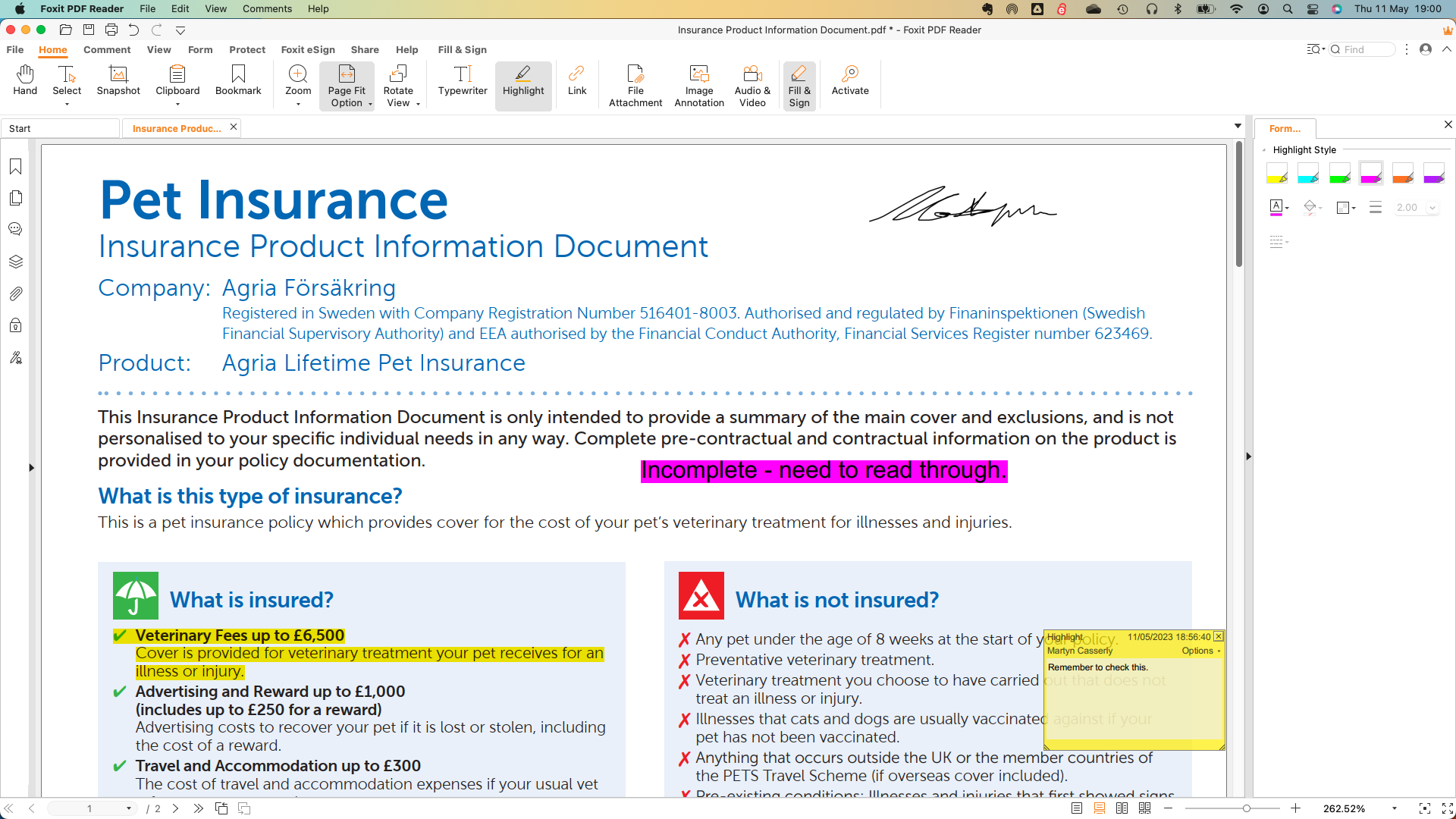
Pros
- Simple and lightweight
- Free
- Enough tools for basic form-filling
Cons
- Might not suit advanced users
Completing our list is Foxit PDF Reader, which is a simple editor that, as the name suggests, allows you to open and read PDFs on your Mac. That’s not all though, as the free program can also let you fill in forms and digitally sign documents.
When you first open the app, its can look a little busy as Foxit places ads for its other software products, including the PDF Editor which is a more powerful version of Reader but requires a purchase. That’s not necessary though, as Reader has plenty to offer. You can enter text into PDF fields, create a new signature or import one you may already have on your Mac so that you can sign-off on forms. Plus there’s various annotation tools on hand, such as highlighting and adding notes.
It’s a nice little app that will probably be all that most people need if they don’t work with PDFs very often.


